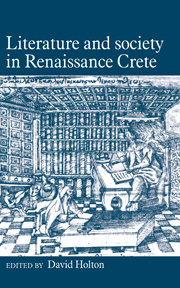Book contents
Preface
Published online by Cambridge University Press: 14 October 2009
Summary
It is sometimes claimed that the Greeks needed no ‘Renaissance’, in the western sense, because they had never lost the knowledge of the language and the literary, philosophical and historical writings of their classical forebears. Indeed, the contribution of Greeks to the European Renaissance has frequently been analysed and debated. On the other hand, the term ‘Renaissance’ is now commonly used to refer to more than one period of cultural renewal in the history of the Byzantine Empire. In the title of this book ‘Renaissance’ is both chronological and cultural: it serves to delineate a period in which a part of the Greek-speaking world came into direct contact with the culture of the Italian Renaissance. The Cretan Renaissance is no more nor less than the reception and creative exploitation of aspects of Italian Renaissance culture from the fourteenth century to the Baroque on the island of Crete.
As an important constituent part of Venice's maritime empire from 1211 to 1669, Crete gained access to the momentous intellectual and cultural upheavals then taking place in Italy. El Greco is the classic case of a Cretan who was able to exploit the possibilities offered by an intimate knowledge of the two cultural traditions, the Greek (or Byzantine) and the western.
- Type
- Chapter
- Information
- Literature and Society in Renaissance Crete , pp. viii - ixPublisher: Cambridge University PressPrint publication year: 1991



